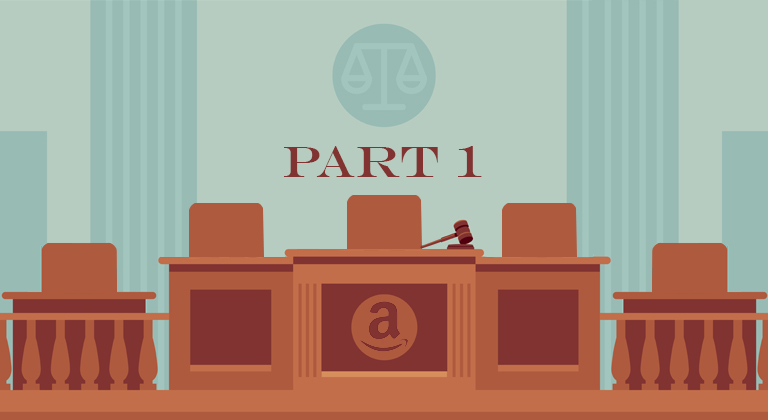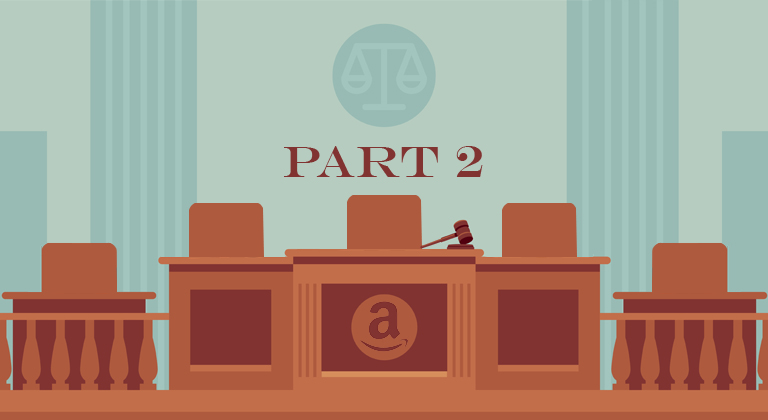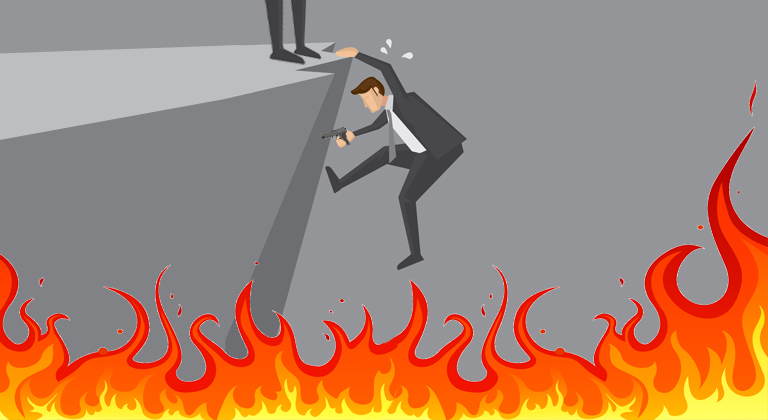An Amazon Appeals Process is Long Overdue – Part 1
A couple of weeks ago, some authors were surprised by a disturbing email from Amazon informing them that due to some vague and unspecific rule violations, their author accounts had been terminated and any outstanding payments would be withheld. These authors did nothing wrong, after a lot of time and effort on their part most were eventually exonerated and had things restored, but the fact that this can happen to anyone at anytime and for no good reason should not only serve as a harsh reminder of the dangers of having all your eggs in one basket, but as further evidence that Amazon needs a proper appeals process for when they inevitably get things wrong again.
There are various arguments for “going wide” and publishing books on multiple online storefronts, but one of the big ones is the diversification you get by not having to rely on just one site “just in case”. I’m sure many authors that are Amazon exclusive discount this argument, figuring Amazon is too big to fail – or at the very least, if the winds begin to shift in support of moving elsewhere, there will be plenty of warning signs giving them enough time to move elsewhere.
Unfortunately, the events of these past couple of weeks have proven otherwise. If Amazon decides you’ve broken a rule, whether you did or not, they can and will shut you down immediately. There may be little to no warning, and certainly not enough time to shift your catalog elsewhere in time to adjust. Amazon doesn’t have to fail in the face of some new competitor before you’re catastrophically affected. They just have to decide to take it all away, and the onus will be on you to fight to get it all back.
And that really shouldn’t be something authors have to live in fear of.
What happened?
Starting a couple of weeks ago, a number of authors were sent notices that their Amazon accounts were terminated, their entire catalogue pulled, and all of their outstanding royalties were forfeit. In some cases this notification was the first they’d heard of any issues, and in other cases they were given some prior warning shortly before the termination. Not that it mattered, because the lack of info or any response for more info meant they could never have resolved it in time anyway.
I’ll provide a few more details below, but for those interested in reading the full story from an affected author, USA Today bestseller Lexi Ostrow wrote a 3 part blog on the whole ordeal as it was happening. To be clear, she was just one of the authors affected around the same time. I’ve seen accounts by at least 2 other authors on private author groups that I can’t directly link to, and have heard talk of others both specifically and generally.
From what I’ve read, most of the author’s had very similar experiences with only a few minor variations, so I’m going to use Lexi’s post as my main source here as it is the most detailed. But where there are differences that I know of, I’ll call them out. With that said, here are the key points about how and what went down.
- Some authors (but not all) were sent a notice about an issue with one of their books – in Lexi’s case she was sent an email that her new release contained some misleading info that may lead to a poor buying decision for customers. In Amazon’s typical vague fashion, it essentially just claimed that something about her book was similar to some other (undefined) book by someone else, but no further details were offered either in the original message or in response to her requests.
- Soon after a new email arrived (for some authors there was no initial warning email, so this was their first email) stating that the author’s account had been terminated due to “…misleading content that have the potential to mislead or defraud our customers.” I’m not sure if all affected authors got the same message, but that’s what was in two separate email screenshots that I saw. They listed a single offending book and noted that the author’s account would be closed and they would no longer have any access to them, all books would be removed from sale, and they would receive none of their outstanding royalties.
- Attempts to contact anyone at Amazon was as difficult and infuriating as usual. Throughout the more than weeklong process of getting this resolved, Lexi received about 20 different email responses telling her she was out of luck and nothing could be done. None of those responses ever offered any further info about what the actual issue was or which rules were broken. It was next to impossible to get anyone on the phone and certainly no one beyond low level reps. Apparently she was told that the KDP content team (the ones responsible for the ban) had no phone access.
- For authors that continued to push and fight, the issue eventually got resolved although how that was done varies. For Lexi, it took 8 days and even then it was only because she took the issue to social media. Funny how that always seems to get more attention from a big company intent on ignoring you!
So first off, let’s be clear that in these cases where everything was resolved, there was no actual wrongdoing on the part of the accused. Amazon is well known for (eventually) reversing their decisions when they finally investigate something and determine an error was made, but I don’t know of any cases where they decide to let someone off that they actually believe was trying to get away with something.
No, they go after those people hard.
And in Lexi’s case at least, she was even told by the executive that eventually contacted her that while he didn’t know what caused her account termination in the first place, he does know that there was “no suspicious content” in her book.
Again though, the above is really just a quick summary of the issue and I encourage you to read Lexi’s blog and peruse some of those other links, and if you search around in other author forums you’re bound to find even more info about this.
But that info is enough for most authors to see how bad this issue is, and how vulnerable they are – especially if writing is their full-time job, and even more so if they are exclusive to Amazon. For no valid reason whatsoever, any author, even a USA Today bestseller that has been writing for years, might wake up to find everything gone. And while this time it seems to have eventually gotten resolved, there is no clear reason why it happened in the first place or that any of it would have EVER been resolved if the authors hadn’t fought so hard to have someone actually look into the issue, despite being repeatedly told it was a closed issue and nothing could be done.
To expect change we have to ask for the right changes…
Now, ideally no author (or anyone else) should ever be falsely accused, but realistically, especially with what we know about how Amazon works, this type of thing is inevitable. It’s not just authors that get accused of things they didn’t do, I’m sure it happens across the product lines and I KNOW it happens to actual customers. I often hear from readers that had their legitimate Amazon reviews blocked or removed, but then eventually released when the customer pursues the issue.
So yes, mistakes or errors will happen and while it sucks when it happens, it’s unrealistic to simply argue that Amazon should (or could) simply make the whole process for everyone and everything infallible.
As a community of authors, we need to accept that because it’s not going to change.
What can and should change, however, is how these mistakes and errors are handled and resolved. That’s the part of the process that is completely broken and requires a complete overhaul, and is really where all the anger and outrage should be focused.
But even then, if we really want a chance at being heard and taken seriously, we have to be realistic in what we ask for and the changes we demand.
Let’s be frank, the chances that Amazon will change anything are probably pretty slim unless some real momentum around this issue begins to build. But even if that happened, even if Amazon was willing to listen and make changes, they will only do so if what we’re asking for is reasonable and realistic.
Let me clarify. Reasonable and realistic to them.
For example, most of the anger around this issue is centered around how vague Amazon’s rules are that authors are expected to follow, and many can’t understand why Amazon doesn’t just clarify them. Or, at the very least, tell an accused author exactly what they did wrong so that they could defend themselves.
From an author’s point of view, that sounds completely reasonable and realistic. From Amazon’s perspective, however, I would bet that’s one of the asks that would make this whole thing completely dead in the water.
Since we’re authors, let’s put this in terms of a novel we’re reading where there is a clear hero and villain. We root for the hero because his way is right and just, and we see everything that the villain is doing as evil and unreasonable. Until suddenly the author flips the perspective and writes a chapter from the villain’s point of view. All of sudden we understand why they’re doing what they’re doing and even if we still don’t agree with their actions, we at least have a better understanding of how the world is not always as black and white as it seems.
That’s what we have to keep in mind here. Even though as authors it might seem obvious what needs to be fixed to make this problem go away, from Amazon’s point of view those same things might be ones they are unwilling to even consider changing. So to make sure we ask for the right things, we have to first understand what we shouldn’t bother asking for, and why.
Amazon’s Perspective
There are many things that infuriate authors about working with Amazon, but I’m going to keep this discussion focused on the two that are most relevant to this whole situation, and why these issues exist as they do in the first place.
Vague and General rules
The first and arguably one of the most vexing issues is how completely vague and generalized many of Amazon’s rules are. This not only makes it next to impossible to know if you’re even violating them, but also can (and does) make their enforcement seem completely subjective and arbitrary.
In fact, we probably shouldn’t even refer to them as “rules” at all, since they don’t actually meet the dictionary definition of the word.
Rule: one of a set of explicit or understood regulations or principles governing conduct within a particular activity or sphere
Amazon’s rules are rarely “explicit” or “understood” by anyone – often including their own staff. What Amazon enforces is more a set of vague guidelines, often grouped together in a way that may at first seem to allow them to be more specific, but in practice actually allows them to be even more ambiguous.
Take the example from Lexi’s blog, where their original email claimed that something about her book “causes a misleading customer experience because it impairs consumer’s ability to make good buying decisions.”
On its own, that could be almost anything, and is also completely subjective. What one person might find misleading, another person might find completely clear.
But the email does provide more detail, let’s see if that helps?
Items that can cause a misleading customer experience include
-
Similarity of the contributor name to another author
-
Similarity of the title to a previously published book
-
Similarity of the cover to a previously published book
-
Similarity of the publisher listed in the book details to another publisher
This is an example of how breaking down an issue into more specifics isn’t always more helpful, particularly when you miss the point of doing it by providing all of them together and essentially just saying “here, it might be one of these.”
More importantly, though, is how subjective they all are. You could literally take almost any self-published book that uses stock art and argue that the cover is similar to another previously published book because it used the same stock photo.
And author names are not unique because actual names are not unique. Another quick search on Amazon can find a whole host of authors with the same or similar names. And if Amazon wants the author names to be unique, why don’t they make that field in KDP unique – so as soon as an author fills in the pen name with a name that already exists, they’ll have to change it? So instead of a bunch of books written by different authors named “Bob Smith”, for example, you might have “Bob Smith2” or “The Real Bob Smith”. Not EVERYONE uses pen names.
But wait, that wouldn’t work because “Bob Smith2” is probably too similar to “Bob Smith1”…
The same goes for titles. I just put a random word (“Broken” in case you’re interested) into Amazon’s search and saw a number of books with that title or some variation of it. Who decides how similar is similar enough to trigger an account termination?
So why can’t Amazon just be clearer with their rules and tell us exactly what is and isn’t allowed?
That does seem like the obvious solution here, and it’s one authors have always asked for in the past, and more so now in response to this current situation.
Unfortunately, this is one of those things that I don’t see Amazon ever bending on, so it’s pointless for us to continue to demand it. The problem boils down to all the bad actors out there, the people or companies that try to make their living by running some scam or another and using the world’s biggest online marketplace to do it.
Yes, scammers are why we all can’t have nice things.
Amazon has had an ongoing battle against scammers for almost as long as they’ve been around – people looking for ways to beat the system, or at the very least get an unfair edge on the competition. From selling fake or counterfeit products, to selling fake reviews, to the parade of Kindle Unlimited changes driven by authors trying to get more from the KU pool than they deserved.
As an example, let’s look at KU. When Amazon launched it, they began by paying authors an equal amount per book borrowed. Well, it didn’t take long for authors to realize that if they were getting paid the same amount for 5000 words as they were for 100,000 words, it was far more lucrative to pump out a bunch of 5000 word short stories. And that’s exactly what happened.
This then led to KU version 2, which paid based on the number of pages read. This stemmed the tide of short stories, but because of how they were calculating pages read (by furthest page opened), some authors began adding links to their books that would take readers from the front of the book right to the end, triggering a payout of the total number of pages in the book. When combined with book stuffing, the practice of adding extra “bonus” material (sometimes entire other books) to the end of their books, this led to massive payouts to those authors and eventually KU 3.
Now, I use the history of KU as an example for two reasons.
First, because it’s a great, familiar and relevant example of how Amazon has to continually work to keep things “fair” for everyone. (I put fair in quotes because I know that many authors hardly consider KU a fair system, but hopefully can still recognize that within the context of the system as it is, Amazon has made changes to stamp out a lot of the biggest ways people were trying to game it.)
Secondly, I think there are some people out there that don’t necessarily think that some of those KU “scams” were scams at all – but rather entrepreneurial thinkers that simply saw a way to exploit a system for maximum gain without breaking any actual “rules”. That’s a debate for another time, but it speaks to the point I want to make here.
Regardless of whether you think that switching to short stories in order to make more money than authors writing full length novels was a good, right or moral decision, the fact is that it wasn’t “against the rules.” There was no rule that said a book in KU had to be a certain number of words (and there still isn’t.) Just like, when KU 2 launched, there were no rules against book padding and links taking you to the back of the book (there are now.)
There are always going to be people looking to exploit loopholes and get away with things that may not break the letter of the law, but the spirit of it. The problem is that in cases like that, Amazon really can’t do a lot about it other than continue to change the rules (and/or the system, in the case of KU). But if they did change the rules to block every possible sort of violation that has or could happen, the rules would eventually be so complex that only a lawyer could understand them.
Instead, they’ve taken the opposite approach. They’ve made rules that are generalized and vague, which essentially gives them free reign to claim a wide variety of actions are in violation and then police them as necessary.
Clear and well-defined rules inevitably lead to loopholes that bad actors could not only exploit, but also get away with by saying that they didn’t actually do anything wrong. General rules don’t stop the scammers, but they do allow Amazon to come down hard on them when they’re discovered.
In theory, that sort of system could work, provided that the entity enforcing the rules could be trusted to do so fairly and consistently, and by ensuring that if an innocent person is falsely accused they had a clear and speedy process for getting exonerated. Unfortunately, neither of those things is happening now.
Lack of Violation Examples
The second issue that infuriates authors, and this is the one most authors are angriest about when it comes to this account termination situation, is that when Amazon does determine there was a violation, they refuse to give examples or specifics about what the violation was. Or even be specific about which exact rule was broken, as we saw in Lexi’s example above.
This problem is actually very much related to the first one so I’m not going to spend as much time on it. I really only break it out separately because I’ve seen so many incensed by this.
Surely if someone breaks a rule and is being punished for it, they should be given the specifics of the violation in order for them to have a chance at defending themselves?
I personally agree with that sentiment in principle, but again, I think there is a clear reason why Amazon doesn’t provide those specifics, and you already know what it is because I just wrote all about it in the section above.
By telling a bad actor what it was that got them caught, they would then know exactly what to do differently the next time they try. If they provided this information then there would really be no point in them having general and vague rules in the first place.
Essentially, this whole thing is Amazon employing their version of security through obscurity.
And I think we can all agree that telling authors to keep the information to themselves is unrealistic. In this day and age, where people tweet or post about everything, that information would be out there the moment it was revealed to the very first author. Even if it just appeared somewhere “anonymously”.
In fact, the very absence of a leaked set of rules on the internet tells us something else, something that makes this whole thing much more frustrating but has always been suspected.
That is, that most Amazon employees don’t know what the real and clear rules are, either. One would love to believe that while the publicly available rules are vague and general, in order to fairly and uniformly apply those rules to authors, Amazon employees themselves should have access to a much clearer and specific set that they can refer to.
Unfortunately, given that these rules haven’t ever “leaked” despite the low wages, poor conditions, and large employee turnaround that Amazon is notorious for, is proof enough that no such list exists. Or if it does exist, it is only available at the very highest level – a level that most accused authors asking for their cases to be appealed never get access to. Perhaps that’s why Lexi’s executive contact eventually admitted that there was no actual violation, despite Lexi having been told differently from about 20 previous Amazon employees.
Where do we go from here?
The American legal system might employ an “innocent until proven guilty” policy, but Amazon works completely opposite of that. To them, if you’re accused then you’re guilty until (and if) you can prove otherwise.
Although, I imagine Amazon sees it differently. I think if pressed, they would likely claim that they assume everyone is innocent until they find them doing something wrong, at which point they’re guilty. But since they skip the whole trial by judge and jury of their peers bit, I wouldn’t put much stock in that point of view.
But that’s the whole problem.
There is no clear, obvious, easy or reliable way to appeal a decision that Amazon has made. And while I don’t doubt that they shut down FAR more actual scammers than innocents, we’ve seen time and again that their system is flawed. Authors are falsely accused, and even if that’s just a rare or occasional occurrence, that doesn’t make it acceptable. Not when more can be done.
Amazon has long had a shoot first and ask questions never approach, and that needs to change.
This industry may have started out small, with a few self-published authors trying their hand at writing in the hopes of making enough money to buy a case of beer or have a fancy dinner. But over the years, the industry has grown and there are a great many authors that earn their entire living, support their whole family, on the money they earn self-publishing on Amazon. So when Amazon decides to shut someone down, they aren’t just taking away a few bucks and sending them off to go try something else. They’re essentially firing them for their job. Yanking away a career they may have spent years building up.
For our part, as authors, I think we need to accept that due to the nature of how Amazon works and what they’re up against, mistakes will happen sometimes.
But what we should not accept is that those mistakes can be catastrophic to our livelihoods.
We should not accept that decisions made in secret, or by some algorithm, are final and cannot be appealed.
Yes, we have to be realistic in terms of what we can expect or ask for, but we should not accept that the system as it is now cannot be changed or improved. Because it can.
A clear and proper channel for appeals can make the system fairer to authors, take away the fear that everything could be stripped away at any point (even if it is just temporarily), yet still be viable for Amazon.
Today I’ve talked a lot about what I think is unrealistic to ask Amazon for, but next week the focus shifts. Not just for what we can ask for, but for what we should be demanding.












the biggest problem with KDP is lack of training- the AI bot flags nearly all accounts each day for possible violation and the KDP Kindle Content Review is supposed to look at the possible violation. Most of the time, the AI bot is just being annoying and accounts are safe but that one person, who doesn’t know the rules will give a vague reason , I call it bullying -then you have to think the same song and dance- KDP Random terminate accounts so the authors say “KDP Approved of the books/cover.” Since KDP has to follow the KDP TOS rules, per. KDP reviewer, they are suppose to make sure manuscript and cover follow the KDP Rules and when you get approved as an author, author is happy because they 100 % knows that book follows KDP Rules, which they knew in the first place since they published it. So why do random terminations? Many websites will say “well person violated” – I got ‘manipulation of services” and I had to find an old blog from 2017 talking about that and that is due to people reviewing my books and promoting them, apparently you can’t promote your books although KDP allows it but AI got triggered and KDP person didn’t look at why AI Got triggered so my account got terminated due to ‘manipulation’ except I don’t promote my stuff – but I have googled and noticed several blogs have. Then you have people reading your stories under KU-kindle unlimited and if they scroll at Superman reading speed, that also triggers AI Bot for ‘manipulation’ – again, most of the terminations has nothing to do with the author violation – has to do with KDP doesn’t train the people right- and I found a job opening to work at KDP, the questions they ask just to get an interview (no I didn’t get one lol) but one was “if a possible violation happens do you terminate account without warning or do you look at the account to see if there are any red flags, and if there is, you should contact author first to find out why before termination”- point is, youtube has ‘if you get terminated do this'” point is, most of the time us authors did nothing. the AI bot is faulty and when accounts get closed people are helping other publishing companies gain customers as TOS is the same across the board.
Thank you for the information. My KDP account was suspended, then terminated. I got it reinstated after about 2 months. I outlined my experience on my blog. I hope others find it helpful.
https://wake-book.myshopify.com/blogs/news/cover-story
Hi – thanks for your article – are you comfortable to share the contact details for the lawyers who sent through the letters
Interesting read…I am myself at a lose end. I have recently decided to make notebooks and journals. Maybe the market is saturated in these ?
But I was excited to make this notebook and my first publishing ever on KPD. I was awaiting approval.
Then one morning I wake up an email saying my account is terminated, because I have other accounts and this goes against terms and conditions.
I can be quite sure I do not have other accounts. I felt it was harsh…this was my first entry, I checked everything.
I have tried emailing and getting no where and they just repeat what was said before and not answer any of my questions.
The last email they said this is their final decision. I am, deeply upset. I feel penalised for something they are accusing of me of. That I have not done.
Thanks, Craig! A great heads-up on a real danger to indie publishers. I’ll offer a couple of thoughts on why this sort of thing happens (and will continue to) based on my limited understanding of similar processes elsewhere. None of the following is meant to justify Amazon’s approach or excuse the harm it causes to real individuals. I’m just offering a possible explanation for how things got to be the way they are.
My guess is that this is basically an example of opaque and poorly-designed machine learning algorithms at work. In many (though not all) senses, Amazon treats authors like any other sellers — and there are LOTS of sellers. So they automate the detection of violations. A machine learning algorithm computes an author’s overall probability of violation, and Amazon likely has some threshold for taking action (again, automated). The causes they list in the email (and in their policies) probably factor into their model (each via a numerical proxy of some sort) along with lots of other stuff. The model doesn’t come up with a “cause”, just an overall probability. Unless they use a linear model (which I very much doubt), they can’t even compute which factors contributed the most to the decision. This is one of the big problems with such models: the factors involved may be semantically meaningful but the result is opaque. There IS no specific cause that can be pointed to, and my guess is that this is why they don’t offer one. The rules aren’t vague because Amazon is being evasive, but because they ARE vague. In that case, Amazon just is describing some of the factors the model uses, not hard-coded “if-then” type rules.
Another reason they may choose to avoid publishing specifics is to avoid being gamed. If someone is indeed a bad actor, and is told that action X caused the ban, they could create a new account (or use another existing account, which they often have) and simply avoid X. The more insight they have into the operation of the fraud-detection algos, the less effective those algos become. It’s a cat and mouse game between Amazon — whose goal is to keep its customers, not authors or sellers, happy — and fraudulent sellers (of which there are many). You may think this doesn’t apply to authors, but Amazon does not distinguish the two. There are many sleazy third party sellers and a few sleazy authors (ex. publishing huge numbers of unedited manuscripts from project gutenburg under their own presses). Basically, authors are being punished by the algos for the prevalence of fraud in other markets.
Automated models are becoming ubiquitous in all social media (as they already were in CC fraud detection), and to some extent this is unavoidable. With hundreds of millions of participants, it simply is not viable to hire an army of human inspectors to police them. Even the appeal process would be inordinately expensive if a large fraction of designated-violators appealed. The bad actors certainly would appeal, again trying to game the system since it would be no skin off their back.
From my perspective, Amazon is at fault in two ways:
(1) Its automated fraud-detection algorithms are very poorly designed. Sadly, most ML algorithms are. There are legitimate ways to build ML algos (and determine their limitations), but few people have the understanding or inclination to do so. Most people just throw a bunch of factors into an opaque “deep-learning” algo (aka multi-layer neural net) and call it a day. My guess is that Amazon does this as well. Why? Because it’s cheap. Doing things right is hard and expensive. This said, when it comes to ML the results ALWAYS are opaque, and there is no “right” answer. There is a tradeoff between false negatives and false positives. False negatives piss off customers and false positives piss off sellers. Amazon only cares about customers. Moreover, the lowest error-rate a model can attain based on the available data may still be quite high. Even for a sensible model, there are statistical limits on what can be achieved. The “best” answer (based on available data, etc) may not be very good. One thing Amazon should do is have a human give a cursory glance to each case which warrants serious punishment (i.e. account closure, etc) to make sure it isn’t obviously wrong. A simple sanity check could eliminate 80% of false positives.
(2) The appeal process is a trade-off between accessibility and cost (and dissuading bad actors from pursuing frivolous appeals). It certainly should not be impossible to get reinstated without clout (i.e. a huge social media following or connections or a good lawyer) or be inordinately burdensome. A good way to structure it would be to have a hierarchical system, much like the US court system. At the lowest level, a quick review would be granted after some dissuasive hassle (to avoid being overwhelmed by fraudsters). I suspect that this would catch most issues. Then there could be a second level for cases where the author pushes back reaaaally hard (which fraudsters probably wouldn’t deem worthwhile). Finally, there could be some sort of legal arbitration as a last resort.
I know this may incur a lot of blowback, but instituting an appeal fee may help as well — especially if that fee funds a quicker and more transparent appeal process. This runs the risk of creating an adverse incentive (“gee, it would be a pity if this nice book business got broken, better pay us a protection fee”) and also would substitute money for social-media heft as an accessibility criterion. However, it could be argued that, since the primary damage in such cases is economic, money is an appropriate currency for this process. They could refund the appeal fees on successful appeal (which also runs the danger of creating an adverse incentive for them). Sadly, nobody has come up with a fullproof system for such things. But Amazon’s is pretty awful.
Sorry — bit of a long comment here. Anyway, just some thoughts on how we got here and why it’s not likely to improve any time soon.
Hi Ken – thanks for you thoughts. I completely agree that a lot of the decisions are driven by AI. Amazon is well known for using algos to do most of the heavy lifting on fraud detection, and they even mention it in some of their guideline pages. I was going to include a brief mention of that, and probably should have, but the article was already really long but I do plan on mentioning it a bit in part 2. Not to the deep extent you did above though, so I’m glad you posted that as it’s definitely informative!
I also agree that the algos are inevitable and the cost of doing business for Amazon, but no algo should be given the ability to make an account termination decision and to be completely honest, I have no idea if they do. That was another reason why I didn’t include that… I know the AIs are part of the decision but I don’t know if they make any final decisions at this level, and certainly hope they don’t. I’m pretty sure that they do at the customer level in terms of blocking reviews, as those are often wrong and almost always successfully appealed by customers willing to go through the hassle of getting someone to review their case.
Regardless of whether an account termination decision is done by AI or some random rep though, it doesnt’ change the fact that due to the seriousness of the consequences, they should always be reviewed by a much more senior and well informed human or committee before any decisions are made, and authors should be given the chance to appeal their case. I don’t think asking to pay for that is the right approach though.
I understand the argument that the appeals process could potentially be overwhelmed with bad actors appealing their case but quite honestly, I don’t think that would really be a huge issue. Most people that will ask for a human appeal would be doing so because they believe they are innocent. Most people knowingly doing something against the rules would have little to gain by asking Amazon to look into what they were doing even deeper than they already had, because all they’ll find is evidence of wrongdoing. And Amazon actually has a history of pursuing bad actors fairly aggressively, including suing them. All they would have to do to deter improper appeals is continue or step up that game. Ask them to look into your case when you were running some scam, you run the risk of them seeing just how guilty you are and suing you into oblivion.
I’ll talk more about most of this is part 2 next week though. Thanks again for your comments!
Craig
Very informative and timely information. However, the question is, who in Amazon can authors sit down with and get some of these things done? It is a faceless monolith that communicates in the impersonal world of emails.
If there were a real person, or even a committee, to discuss these things with a lot of authors may be interested in helping get these changes in place. But as it currently stands, we’re without a voice.
Having a plan or at least a few ideas on how to lobby for changes at Amazon is likely the first step in this process… and I don’t have a clue as to who to contact to get this ball rolling. Does anyone else know where to begin?
You’re right, Dale – and that’s one of the biggest issues that can and should change. There is no reliable point of contact that authors can use to really get heard. Contacting front line support goes nowhere. When I post part 2 of this next week, that’s one of the major changes I will be suggesting.
In terms of how to lobby Amazon at all, I think the only way to do that is through enough authors understanding the issue and making noise about it. That’s why I posted this. My hope is that it gets shared around, or sparks some conversations elsewhere, enough so that authors start to make some noise about this on social media or wherever – enough noise that Amazon can’t continue to completely ignore it.
Craig, while this is a horrible problem with Amazaon, I’m SO glad to see you address it so thoroughly, When I went through a similar experience last week, I felt like I was the only author out there with this situation. Although they didn’t threaten to pull my books, I got stuck in “review jail” after simply changing my keywords on a book that’s been published for several years.
As you say in your post, no matter what I asked to try and get to the bottom of it, they sent me back a form email as if they hadn’t read my query (which a phone rep admitted they hadn’t). It was especially frustrating as I had the book scheduled for a Kindle countdown around which I’d bought a number of outside promos (including Hidden Gems:>)
Fortunately, through some act of magic, after a week, two hour-long phone calls and myriad of emails, I got one last email out of the blue, saying my book had passed the review. Ten minutes prior, I had received another form email indicating I was still stuck in the review process!
You are right that going wide is a way to compensate for this, but after a year of languishing on the other platforms, and just not having the bandwidth to keep up with all the marketing on each of them, I had just recently brought my books back to Amazon’s KU. Initially, I thought maybe the fact that they said my book was published elsewhere had something to do with the fact that I’d recently been wide.. But no, I double-checked and my e-book was nowhere else online.
Know what it was? The paperback version had once been published with Createspace, which as you know, was rolled into Amazon! At least that’s what a junior rep thought the issue was. I’ll never know for sure. I’m just grateful (though still angry) that my book was released before my countdown and promos began.
Thank you for tackling this very important issue in such detail. As an author, I don’t want to cut off my nose to spite my face. Amazon knows this and as such, continue to get away with this type of behaviour. I have another (bestselling) author friend who has been banned from leaving reviews and she has no idea why. It just goes on and on. Sigh!
I could not agree with the blog more and I am surprised that more people aren’t demanding this. I reckon that Amazon makes about a couple billion from indie authors per year. Not only do they take a percentage of our sales but we pay them to advertise our books. Then to take the risk of entire accounts being erased without any due process is ridiculous. We need to band together and renegotiate our contracts, but as it’s Amazon, it would take ALL of us. And a lot of indie authors think it won’t happen to them so it will take a great push.
So true, Olympia!
Important read! For various reasons, I rarely read an entire article, yet Craig definitely knows how to speak to “The Author” making this article worth the time.
My account was terminated after 5 years for ‘ manipulation of services’ no violations no warnings- trying to appeal and no response. Apparently Feb and March 2023 has another massive termination. Kdp used to be good… also all of my books followed Amazon TOS.